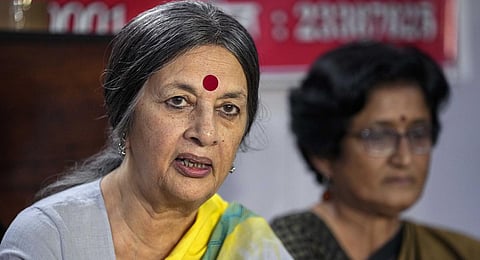

NEW DELHI: CPI(M) politburo member Brinda Karat spoke to Preetha Nair about her visit to strife-torn Manipur. She was part of a delegation of All India Democratic Women’s Association (AIDWA) that visited the state from August 9-11.
Excerpts from the conversation...
You visited Manipur and submitted a memorandum to the President. How do you assess the situation?
The situation is extremely grave and there is a dire need for a political solution, which is being ignored by the Centre’s double-engine government. The statement of the PM on Independence Day was misleading. It was a message to the nation, but it was misleading regarding Manipur.
The country stands with Manipur, but the Centre does not. It aims to conceal its accountability and the culpability of the state government. Consequently, the lack of accountability of the Central government and the culpability of the state government has led to a situation where a “Wagah border” has been created within an Indian state.
What makes you say that?
Both geographically and literally, a border has been established. On one side, there’s the CRPF, followed by a no-man’s-land, and then the Army and Assam Rifles. People from the Valley area cannot venture into the hill areas, and vice versa. This situation resembles a border with a neighbouring country due to the lack of accountability and the culpability of both the Central as well as state governments.
What kind of political solution would you propose for peace in Manipur?
The Central government and the people of Manipur need to decide on a political solution. However, three steps are crucial for this solution. First, deliver justice to the victims, as peace cannot exist without justice. Second, remove the Chief Minister, who acts as the main barrier to a political resolution. Third, pay attention to the voices of the people and peace engaging in divisive politics.
You visited relief camps. What did you witness there?
The people in relief camps want to return to their homes and resume their normal lives. They are frustrated and distressed, especially children and women who are deeply affected. Children are missing out on education. While arrangements are being made for children in the Valley area to attend school, tribal children in the hill areas lack access to education.
It’s a shameful situation that no child from any relief camp can attend school. They receive minimal food, just pulses and rice, without any prospects for the future. They want answers about their homes and lives, and they want to go back.
You also met the survivors of sexual assault. What transpired during those meetings?
The survivors are profoundly traumatised and in despair. They know that the perpetrators of the violence against them remain free.
You also met the governor. How did she respond?
The governor expressed concern and obtained details of our suggestions. She apparently dispatched a team to a specific relief camp we mentioned, which was in a dire situation near the border. The team provided some relief and organised water arrangements. Most camps lack water, hygiene, or sanitation, creating challenges, particularly for women. The governor also met the victims and expressed relief that the Supreme Court is taking notice. She refrained from criticizing any government and expressed genuine concern.
You submitted a memorandum to the President...
The President also voiced concern about the relief camps. I briefed her on the details of the sexual assault victims, and she expressed deep sadness upon hearing about it.
Additionally, rations aren’t reaching the hill areas due to blockades. The routes through Mizoram take around 15 hours for a truck to cross, even longer during the rainy season. Consequently, prices are exorbitant, and the ration system has collapsed. Unorganized workers are struggling, with reports of many eating only once a day due to lack of work.
You’re suggesting that the division between the two communities runs deep...
This division isn’t spontaneous; it’s a product of the government’s narrative and actions. Even now, the way they discuss the tribals is shameful, and they should be ashamed of themselves.